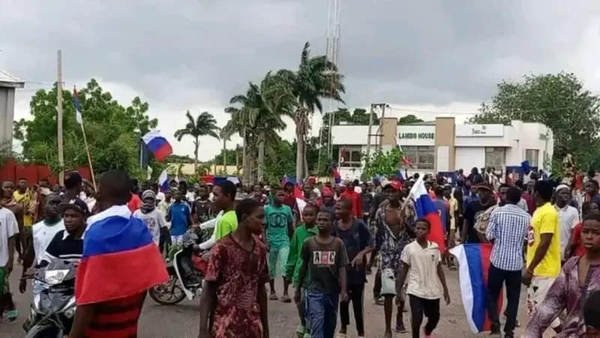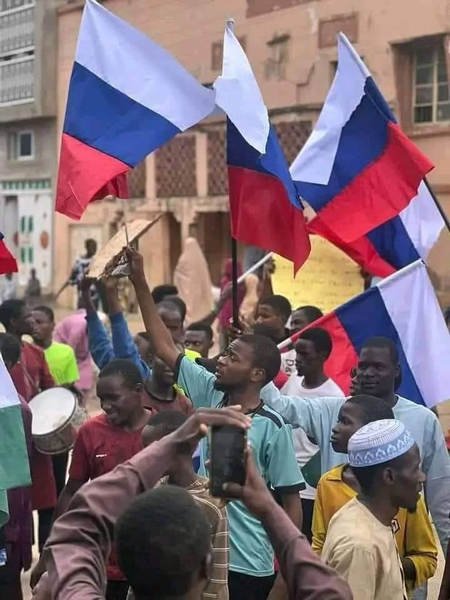- Details
- Headlines
Nigerian Protests Escalate: Russian Flags Raise Concerns of Foreign Meddling
In recent days, Nigeria has been gripped by widespread protests against economic hardship, exacerbated by allegations of corruption and poor governance. Amidst the turmoil, concerns have risen regarding the influence of Russia, as some demonstrators have been seen wielding Russian flags during protests across various states in Nigeria.

Authorities in Nigeria have condemned the display of Russian flags, labeling it a treasonous act against the country’s sovereignty. However, the Russian embassy in Nigeria has swiftly distanced itself from these allegations, asserting that it has no involvement in the ongoing demonstrations. The embassy released a statement clarifying that the flags are personal choices of the protesters and "do not reflect any official position or policy of the Russian Government."
The protests, which have persisted despite President Bola Tinubu’s calls for an end, began on Thursday in response to the West African nation’s worst cost-of-living crisis in a generation. At least 13 people have died as security forces have been accused of using excessive force against the demonstrators.
On Monday, President Tinubu held a meeting with security chiefs in the capital, Abuja. Following this, a curfew was declared in northern Kaduna state — the sixth state to implement such a measure since the protests began — due to reports of looting.

The ongoing economic crisis in Nigeria is driven by surging inflation, which has reached a 28-year high, and economic policies that have devalued the local currency against the dollar. Although President Tinubu has expressed his government's commitment to addressing the citizens' concerns, he has not provided a concrete plan, according to Lagos-based SBM Intelligence research firm.
Over the weekend and again on Monday, a few protesters were seen waving Russian flags in northern Nigeria, a region severely affected by the economic crisis. In response, Nigeria's military chief, Christopher Musa, declared that the display of Russian flags constitutes treason and would be treated accordingly.
The presence of Russian flags in Nigerian protests comes amid growing pro-Russian sentiments in parts of West Africa, where Moscow has increasingly been welcomed by militaries that have staged coups and distanced themselves from Western influence. Neighboring Niger, for instance, has recently asked French and American troops to leave, opting for Russia as a new security partner.
President Tinubu, in a warning to protesters on Sunday, urged them not to allow "the enemies of democracy" to use them to promote an unconstitutional agenda in Nigeria. It is noteworthy that Nigeria currently holds the rotational chairmanship of West Africa's regional bloc.
In addition to the public statements, Nigeria's secret service reported the apprehension of some tailors in northern Kano state who were allegedly responsible for making and distributing the Russian flags. An investigation into the matter is ongoing.
As Nigeria continues to grapple with these multifaceted challenges, the influence of foreign entities in its internal affairs remains a sensitive and critical issue.
- Details
- News Team
- Hits: 1051
Local News
- Details
- Society

Kribi II: Man Caught Allegedly Abusing Child
- News Team
- 14.Sep.2025
- Details
- Society

Back to School 2025/2026 – Spotlight on Bamenda & Nkambe
- News Team
- 08.Sep.2025
- Details
- Society

Cameroon 2025: From Kamto to Biya: Longue Longue’s political flip shocks supporters
- News Team
- 08.Sep.2025
- Details
- Society

Meiganga bus crash spotlights Cameroon’s road safety crisis
- News Team
- 05.Sep.2025
EditorialView all
- Details
- Editorial

Robert Bourgi Turns on Paul Biya, Declares Him a Political Corpse
- News Team
- 10.Oct.2025
- Details
- Editorial

Heat in Maroua: What Biya’s Return Really Signals
- News Team
- 08.Oct.2025
- Details
- Editorial

Issa Tchiroma: Charles Mambo’s “Change Candidate” for Cameroon
- News Team
- 11.Sep.2025
- Details
- Editorial





